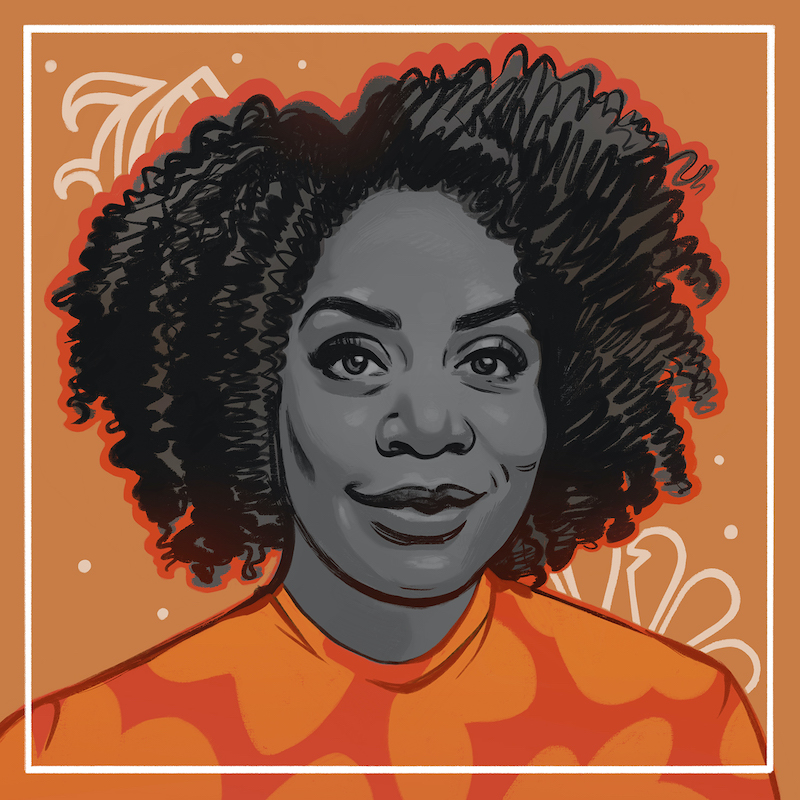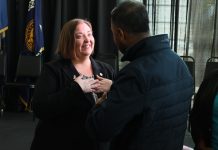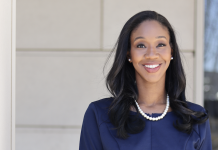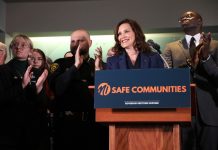
Much to her parents’ angst, Kimberly Atkins Stohr decided in 2000 that becoming a lawyer was a mistake. She’d gone into six-figure debt for that Juris Doctor degree, and now she wanted to throw away a budding career to become, uh, a journalist?
Two decades later, her parents feel much better about that shocking choice. The legal analysis column in The Boston Globe is great. The co-host gig on the hit weekly podcast #SistersInLaw is fun. But it’s the Southfield and Oak Park native’s ubiquitous appearances on MSNBC, where she’s a legal and political pundit, that finally redeemed this choice in the eyes of her father, a retired secretary-treasurer of Cement Masons Union Local 514 in Detroit, and her mom, a retired homemaker, Atkins Stohr says.
After getting her undergraduate degree at Wayne State University, where she wrote for the school paper, The South End, she headed to Boston University School of Law and then spent three years as a litigator before enrolling at the Columbia University Graduate School of Journalism in New York. After that, she put in stints at both Boston daily newspapers and then covered the Supreme Court for Lawyers USA. That led to a guest-host gig on C-SPAN’s Washington Journal and, since 2017, her ongoing MSNBC berth.
In this conversation, the East Cost-based Atkins Stohr, 48, talks about why her Midwest roots improve her work, recalls giving John Conyers a ride, and explains her disagreement with podcast co-host and former Michigan prosecutor Barbara McQuade.
Â鶹·¬şĹ Detroit: You’ve made yourself a prominent journalist by focusing on the other thing you studied: the law. But it does seem like a haphazard way to get to where you are.
Kimberly Atkins Stohr: Yeah, totally, but I’m not sorry. I always knew since the time I was pretty young that I wanted to be an attorney — or I thought I knew. My mom told me often that I was good at arguing, and I thought, “You know, she’s right. I should parlay that into a career.” Along the way I wrote for my high school newspaper and the paper at Wayne State, where I covered, among other things, the [1998] gubernatorial race between John Engler and Geoffrey Fieger. That was really fun. I went to a debate with the reporters from the Free Press and The News, and it was thrilling. But I never thought that would change my trajectory. I also wrote for the school paper when I was in law school, and I ghostwrote a column for an attorney in Massachusetts in the local paper. I was still always doing it. I was telling myself what I wanted to do, but I wasn’t listening to myself.
How quickly did you know, when you started your law career, that it wasn’t forever?
Straight out of the gate I was doing everything I wanted, which was to be a litigator, go to court, have my own caseload. But I still did not feel fulfilled, and I wondered how I could do this for two more years, let alone 20. That just let me know: All right, this is not the profession for me.
How did your parents react?
Oh, they wanted me to be a lawyer. And I can understand that. I’m the youngest of six, and my parents did sacrifice a lot for all of us, so we could succeed, so we could get good educations and go on to have good careers. I’m the first lawyer in my family, and my parents had been immensely proud of me. I felt really guilty. In fact, the essay I wrote for my journalism graduate school application began with something like, “I’m about to break my mother’s heart.” But they wanted me to do the work that I was meant to do. And ever since I’ve been on MSNBC, I feel like that sort of made up for it. My mom can brag about that.
Are there things about your upbringing in metro Detroit that helped make you successful?
Yeah. I do think having an understanding of what it is like to grow up in a Midwestern, middle-class, suburban place with hardworking parents is important. Journalists, particularly East Coast journalists, have a not-unearned reputation as elites with no understanding of what real America is like. Certainly, that’s not true in my case. My background has given me an understanding of employment and labor issues, being that my father spent his whole career in that field, and an early understanding of politics, because again, he was very politically active. I remember going to fundraisers for James Blanchard and being at events and giving John Conyers a ride home. I was in touch with that world in a way that demystified it when it was time for me to cover politics. And so, yeah, it has certainly helped to be able to explain to people here [on the East Coast] what a Coney should look like.
How did the MSNBC thing start?
That began with C-SPAN. I was on Washington Journal, as a guest, and the executive producers asked if I’d want to guest host when their full-time host couldn’t do a show. I thought, “Sure, why not?” Then I was asked onto Fox News, first as a political commentator on Shepard Smith’s show and on the weekend news shows. Then I started getting calls from CNN and MSNBC as well and eventually, in 2017, got a contributor contract with MSNBC.
We’re talking the day before the anniversary of the Jan. 6 Capitol riots in Washington. How different does that day look a year later from how it looked to you on, say, Jan. 7, 2021?
I didn’t think it was the end of Republicans or of Trump’s world, but I did think it would be a wake-up call for America that it did not turn out to be. I thought that was the bottom — watching as the Capitol was being stormed. It wasn’t. There doesn’t seem to be a full understanding of how fragile our democracy is. The fact that we’re a year out and there’s still not that crystallized understanding is really shocking.
You are a Black woman who went to law school 20 years ago. Recent data shows law schools and the profession itself are among the least diverse sectors of American society. Was it the same back then?
Yes. In an incoming class of 400 students at Boston University, there were seven of us. That felt so strange to me, because I had just graduated from Wayne State. My first summer during law school, I came back to Michigan and I interned at a labor law firm in Southfield. Just doing my job and coming across other lawyers, I found the profession was extremely white. You would rarely ever see a Black person — even in a city like Detroit — in the professional buildings, except for the folks on the janitorial staff.
Explain to our readers why this matters.
The people in the legal profession — judges, prosecutors, defense attorneys — are the folks through which the system of justice is administered. If they don’t have an understanding and a background of the real, lived experience of most Americans, then the justice system is skewed against those who have that lived experience. That makes a big difference. It is imperative that everyone from the civil litigators to prosecutors to judges to administrators be diverse, not to check a box but to ensure that everyone is seen and understood.
On your podcast, you and Barbara McQuade, the former U.S. attorney from Michigan, disagreed about the prospective political impact of the Supreme Court reversing Roe v. Wade this year. She thinks it would energize Democratic voters and alter the course of the 2022 elections. You don’t.
I don’t think so at all. We expected a big paradigm shift on gun control after Sandy Hook — that people would vote to demand gun control legislation. Didn’t happen. We expected a backlash after George Floyd was killed, demanding police reform at the state and federal level. Didn’t happen. So, at this point, the idea that striking down Roe v. Wade would result in some big backlash is defied by political conventional wisdom and history. If the shooting deaths of elementary school children don’t do it, I don’t think lack of abortion access is going to. We’re just going to end up with a bifurcated country, where abortion is legal in some places and illegal in others.Ěý
But what about in Michigan, where a full abortion ban still on the books from before Roe would again become the law. Wouldn’t that shock people here?
Again, there was a plot to capture and kidnap the governor of the state and we didn’t see that shift the political paradigm in Michigan.
Speaking of Barb McQuade, did you know her before you became podcasters together? And what’s your take on her?
She’s fantastic. I met her first through MSNBC, but I didn’t really know her that well before the podcast. She is someone who has a very astute understanding both legally and politically of what’s happening right now, but she’s also someone who helps you understand things, regardless of where you fall on the political spectrum. She is whip smart, she’s very funny, she’s just a really cool individual. The last time I saw her, I told her, “I didn’t have any professors like you in law school. None of my professors were cool, funny people who I would want to hang out with outside of the classroom.” And she’s at the center of everything! I was working on a column recently about whether charges of seditious conspiracy should be brought against the Jan. 6 folks, and I looked into the last time a federal prosecutor had charged someone with that crime, and guess who it was? It was Barb McQuade in the Eastern District of Michigan!
What’s the most surreal thing that’s happened to you since you’ve been on
TV all the time?
Well, in my household, one of the coolest things that has happened recently was having Paula Poundstone tweet about us. My husband is a huge Wait, Wait … Don’t Tell Me fan, and so am I. For me, it’s not usually the Hollywood types, but rather legal giants like [NAACP Legal Defense Fund President] Sherrilyn Ifill posting tweets about my commentary on voting rights. You had to pick me up off the floor.
This story is part of the March 2022 issue of Â鶹·¬şĹ Detroit. Read more in ourĚýdigital edition.Ěý
|
| Ěý |
|








